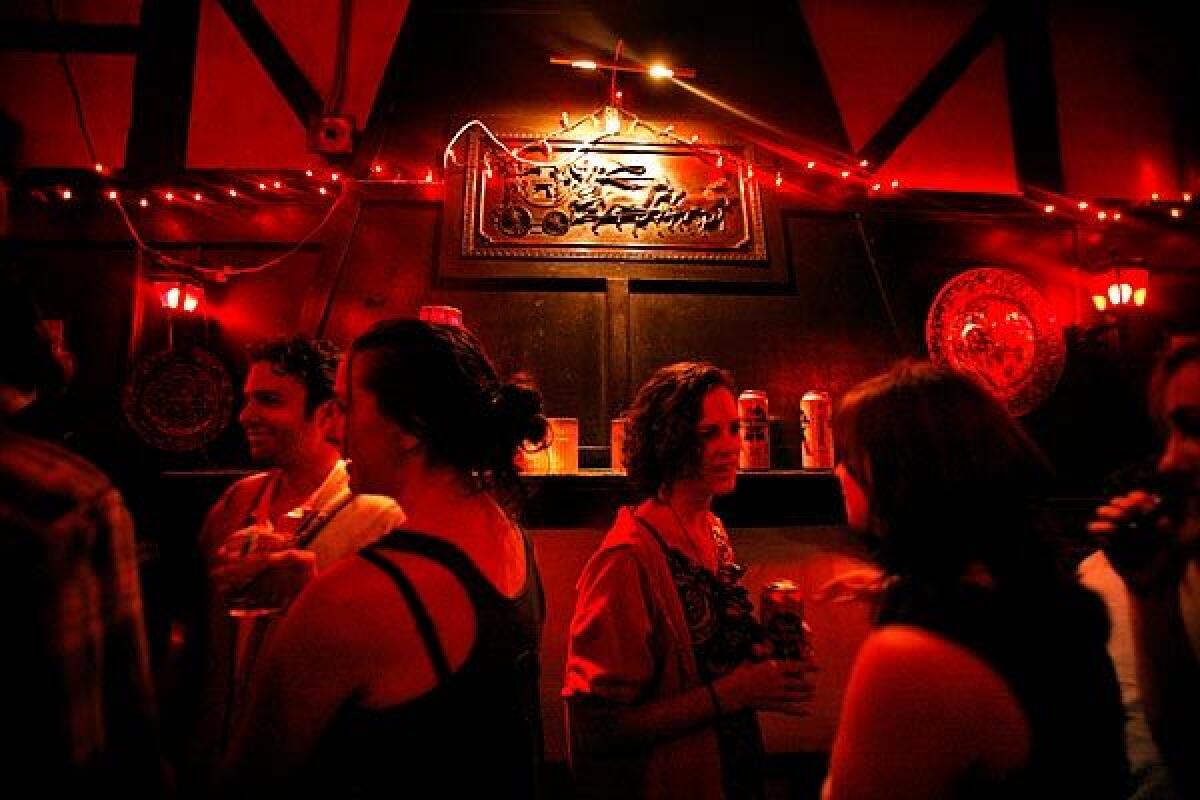Ye Coach & Horses fans saddle up for rescue

Ye Coach &Horses, the Sunset Boulevard juke joint near Curson Avenue that has been in business for more than 70 years, is being evicted by its landlord and neighbor, Samuel French bookstore. The eviction notice, which was delivered July 1 and requires that the tenant be out by Aug. 1, has sparked a passionate online campaign to save the little trapped-in-amber dive bar.
As with most stories in Hollywood, the tale of the bar’s impending closure involves the cult of celebrity, the fickle winds of fate, the city’s oft-lamented historical amnesia and a liberal dose of alcohol-fueled hedonism.
That and the classic plot line known as reinvention. If the bar’s owner, 85-year-old Jane Grant, can’t settle her differences with the landlords — no reason was given for the eviction, but Grant, who has a reputation for being irascible, says the conflict is personal in nature — then two savvy modern bar owners have a strong interest in taking the place over and keeping it exactly as it is.
“I love the Coach & Horses. I literally lived three blocks from it and have been going there since high school,” says Jared Meisler, who along with Sean MacPherson, runs the dapper speakeasy-style Roger Room on La Cienega Boulevard. Meisler says that he has been in touch with the landlords but that no papers have been signed. “Ultimately I want to see the Coach & Horses where it is and what it is, but maybe with a credit card machine and clean bathrooms.”
Still, the pleasantly dingy character of a classic dive bar takes time to cultivate, say Coach & Horses fans who have started a Facebook page in support of the bar and spearheaded a spirited letter-writing campaign to Samuel French. If new owners take over the bar, even with the best of intentions, they say, the results will probably be akin to Dolly Parton post-cosmetic surgery: the same but weirdly different.
“It’s kind of hard to replicate this,” says manager Peter Renaud, sitting in a circular booth and staring around the room, which resembles an old British carriage house with a long wooden bar, fireplace, peaked ceiling, stools with padded red seats, and dim red light cast by red globes and fringe-covered lanterns. “It would be nearly impossible. You feel the age of the place, you know?”
Grant says the British-themed bar was founded in the 1930s when film was full-tilt in its transition from silent to talkies. “The studios wanted English actors because they had better voices and training,” she says, her long white hair pulled back in a stylish sweep at the crown of her head. “So at first it was all actors who came here. That’s how it was.” And how it remained for some time. “ Richard Burton and Richard Harris came here — all the heavy drinkers,” says Grant.
Grant’s brother-in-law bought the bar in 1958 and ran it with her husband until the latter’s death eight years ago. “He was messing up and they wouldn’t give him a regular lease,” Grant says, explaining why the bar currently operates on a month-to-month lease. “If only we had bought the property, but they were interested in partying all the time.”
It was Grant who really started cleaning up the bar, says devoted Coach & Horses regular Ben Reagan, a musician who used to work at Guitar Center down the street. “Before Jane took over there was room for improvement in terms of,” he clears his throat, “ambience.”
Reagan loves the bar for its low-key neighborhood qualities. “It’s a regular place where you can find yourself sandwiched between Cowboy Michael and Dean Stockwell,” he says.
Or Quentin Tarantino, says just about everybody else familiar with the place. Tarantino is known for frequenting the Coach & Horses, and online chatter regarding the eviction often revolves around attempts to reach him and hopes that he will swoop in and save the bar like he did the New Beverly Cinema. (The Times tried to reach Tarantino for comment, but his assistant said that he is “off the radar right now.”)
However, even if Tarantino did offer to help, money is not the issue like it was with the New Beverly, Grant says. “They raised my rent by $2,000 two years ago,” she says, adding that she had no trouble paying and that she offered to match whatever the new lease price is but that the landlords refused to accept.
Samuel French, whose main business is publishing and licensing plays and is a classic Los Angeles institution in its own right, opted not to comment on its internal affairs and instead issued a brief statement.
“We understand that change in the urban environment can be unsettling, but it is a fact of life in Los Angeles and elsewhere, and there are circumstances regarding this particular change that we are not at liberty to discuss,” it reads.
Yes, change is inevitable, but this is one change that the neighborhood would hate to see, says Anastasia Mann, president of the Hollywood Hills West Neighborhood Council, who remembers the bar from when she was small and a father figure of hers played guitar there. “This is a landmark. There are certain things that we don’t want to give up that are part of our childhood and our adulthood. Hollywood is our village.”
More to Read
Eat your way across L.A.
Get our weekly Tasting Notes newsletter for reviews, news and more.
You may occasionally receive promotional content from the Los Angeles Times.







